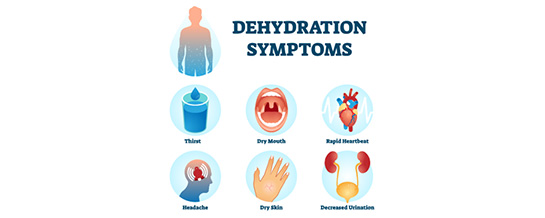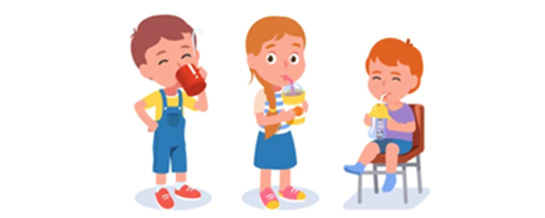How to Care for Your Child with Mild to Moderate Dehydration
This leaflet will provide you with information about dehydration causes, symptoms, diagnosis, treatment and home care advice.

What is Dehydration?
- Dehydration is when your baby's/child’s body loses too much water.
- Children and babies are at higher risk of becoming dehydrated than adults
- Dehydration can be mild, moderate or severe.
- Mild dehydration can get worse if not treated, and the baby/child continues to lose water.
- Severe dehydration almost always requires admission to the hospital.
What are the causes of dehydration?
Dehydration can occur with many childhood illnesses including:
- Vomiting
- Diarrhea
- High fever or an illness that prevents children from drinking fluids such as Sore throat, ulcers
- Heatstroke
- Kidney disease
What are the symptoms of Mild and Moderate Dehydration?
Your child may experience the following symptoms:
- Thirst
- Dry skin and mouth with cracked lips
- Crying without tears
- Feeling tired and lack of energy
- Your baby/child eyes look sunken in the face
- Headache
- Less urine in the diaper or going less frequently to the bathroom, you might also notice dark-colored urine (concentrated).
How is dehydration diagnosed?
The doctor will ask a few questions about your child's health and examine your child. Depending on clinical assessment, your doctor will classify the degree of dehydration that your baby/child has and will decide if further investigation or blood tests are required.
How is mild and moderate dehydration treated?
- Mild to moderate dehydration can be treated by giving your child fluids to drink.
- Some fluids help to treat dehydration better than plain water because they contain the right amount of water and salts (i.e. Oral rehydration solution- ORS).
- Babies who breastfeed should continue to breastfeed from the mother.
- Mild dehydration can be managed at home after learning about oral rehydration solution and how it should be given.
- You will be given instructions on how to give you baby/child rehydration at home.
Home care advice:

- Make sure your child Takes rest and avoid hot weather
- Make sure your child drinks an adequate amount of fluids
- Give your child ORS as soon as they vomited or have diarrhea
- Give your child extra fluids if they are out playing in hot weather
- Monitor your child for signs of worsening dehydration like
- Decreased urination, less than 4 diapers in 24 hours
- Lack of tears when crying
- Cool or clammy hands and feet
- Restlessness
- Dry mouth
- If your baby is exclusively breastfed and vomits immediately after breastfeeding, you can try the following:
- Continue to breastfeed your baby more frequently but for a shorter time (breastfeed every 30 minutes for 5 to 10 minutes)
- If vomiting improves after two to three hours, you can restart feeding as usual.
- If vomiting does not improve within 24 hours, you need to seek medical advice as below

